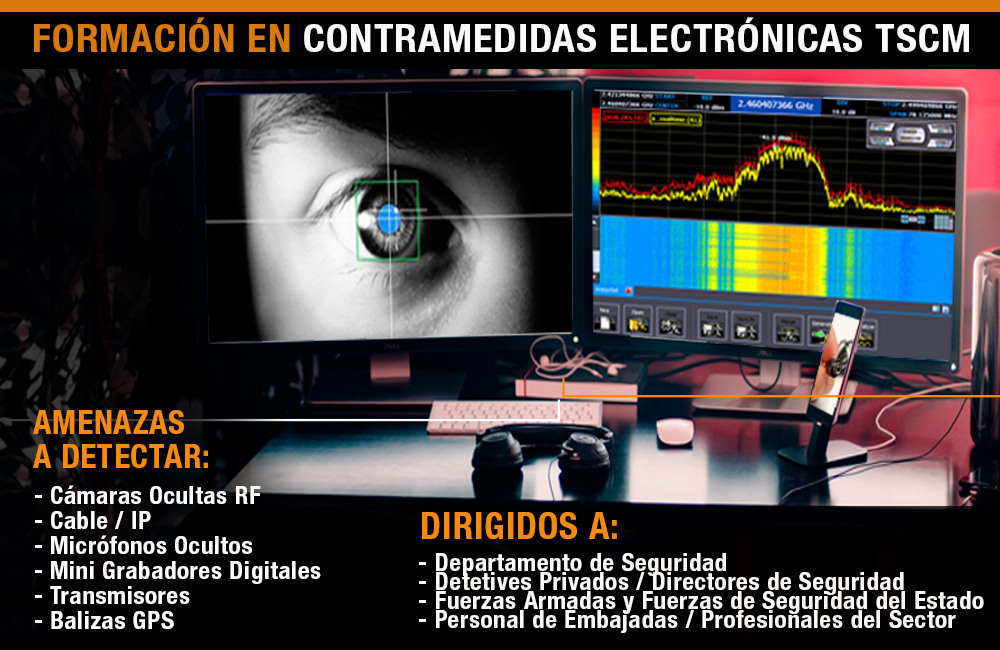
Contact
Scope
We have different instruments dedicated to the location and neutralization of electromagnetic threats, such as microphones, cameras, GPS and recorders.
We also provide training in Electronic Countermeasures to Security Departments, Private Detectives, Security Directors, members of the Armed Forces and State Security Forces, embassy personnel.
Description
The Seminar focus on provide the student with the theoretical and practical knowledge of electronic countermeasures (Technical Surveillance Counter Measures) in order to locate and / or neutralize spying devices in different work environments or private in that can develop its activity.
At the end of this seminar, the student will have obtained the basic capacity to distinguish all threats and vulnerabilities existing in different environments, which with practice will develop sufficient characteristics to offer their services as a specialist in TSCM to the best Corporations, Institutions or Companies Private with the highest quality, booming in these times of global crisis due to the lack of specialized professionals in the field of countermeasures.
Content
Module A: Concepts and History of Security and Communications
Module B: Detection Technologies
Module C: Technical Threats
Module D: Infrared Thermography
Module E: Encryption and Intelligence
Module F: Deontology
Module G: Practical Exercises
Work teams
- Thermal camera
- Spectrum analyzers
- Testers
- Ultraviolet light
- UV markers
- NLJD detectors
- Portable frequency detectors and GSM / 3G networks
- Portable activity detectors 2G / 3G / 4G WiFi / Bluetooth
Threats:
- Hidden cameras RF / cable / IP
- Hidden microphones
- Mini digital recorders
- Transmitters different frequencies
- GPS beacons
Activities and Methodology
- The model of distance learning integral combines conventional teaching through face-to-face classes and tutorial support and autonomous learning. The seminar has three phases; a theoretical, a practical and a final demonstrative. The theoretical phase is carried out at a distance, where the student will acquire and reinforce the knowledge necessary to face the face-to-face phase by reading texts and overcoming self-evaluations. The face-to-face phase will consist of 40 teaching hours divided into 5 sessions of 8 hours each session. The student will practice the handling of different instruments and the different techniques in search and location of threats. For the final evaluation phase, the student will make a complete and accurate report where they will demonstrate the knowledge learned and the demonstrated effectiveness in the location of threats and in the prevention of the assets of a client. The activities to be carried out are composed of 14 self-evaluations, 5 practical works and a final practical report. The practical works will be carried out during the face-to-face phase consisting of 5 sessions (days) in person at morning and afternoon sessions.
Material Didáctico
- El material didáctico del seminario estará disponible para los alumnos a través de la plataforma virtual.El material docente se actualiza cada año y consiste en documentos y textos de diferentes fuentes abiertas y textos propios elaborados por el profesorado del mismo.Para la superación del seminario los alumnos deberán realizar durante la fase a distancia las autoevaluaciones correspondientes a las materias de los diferentes módulos.
Evaluación
- Asistir a la fase presencial de 5 sesiones y superar las 5 pruebas prácticas correspondientes a cada sesión.Presentar en tiempo y forma el trabajo final de seminario que será evaluado por el equipo docente.
